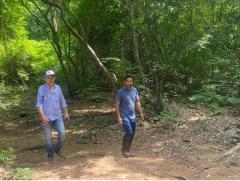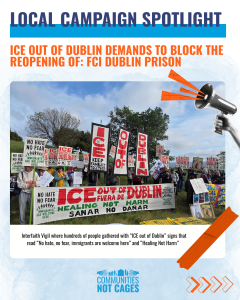
source: NACLA
Cañaverales is the first to benefit from a new government program aimed at protecting campesino communities from industrial development, but corporate power remains a major obstacle to justice and dignity for its people.
In the music video for his song “Justicia,” vallenato musician Hugues Martínez Gámez sings to the camera in front of a glistening blue-green pool of water surrounded by verdant trees and plants. The lyrics capture the struggle to save his town of Cañaverales, in Colombia’s northern province of Guajira, and this beautiful spring from coal mining. “It pains me, very much pains me, that they come from other places to appropriate what is ours. I am indignant that they take advantage of our honor and disrespect us.” Referring to the long history of resource extraction in La Guajira, he concludes the song with: “Gas and salt projects, fracking, energy, and coal, my nation is destroyed by environmental disaster. Justice, justice for my Guajira, justice is what my people are demanding.” Justice means dignity for the people of La Guajira and protecting its natural places.
The Afro-Colombians and campesinos who call Cañaverales home have been fighting to block coal mines from destroying their land and water. They recently won a major victory. On July 5, Colombia’s Ministry of Agriculture and Rural Development declared the first Protected Area for Food Production (APPA, for its Spanish acronym) in La Guajira. The APPA program prioritizes land use for agriculture, aquaculture, and livestock, protecting it from industrial development.
This landmark declaration comes after decades of community activism in the region, particularly from Afro-Colombian, campesino, and Indigenous peoples who have fought to protect their farmlands and forests from large-scale coal mining. The declaration protects 80,000 hectares (197,600 acres) in eight municipalities: La Jagua del Pilar, Urumita, Villanueva, El Molino, San Juan del Cesar, Distracción, Fonseca, and Barrancas. In Barrancas, locals have lived for decades alongside Cerrejón, one of the world’s largest open pit coal mines, suffering waves of displacement, environmental degradation, and violence that have ruined rural livelihoods and separated people form their ancestral territory. Farmers in San Juan del Cesar, where Cañaverales is located, still have extensive agricultural lands but face the same fate as those in Barrancas, as the Turkish corporation Best Coal Company threatens to move in.
"Colombia, Potencial Mundial de la Vida”
Protecting lands for food security is essential in La Guajira, one of Colombia’s poorest provinces. Last year, malnutrition claimed the lives of 70 children in the province, the highest rate in the country. Ongoing droughts due to climate change have been exacerbated by Cerrejón’s overuse of water, threatening local food production.
Colombia’s current government, led by Gustavo Petro and Francia Márquez, is focused on achieving “Total Peace,” a plan that includes investing in rural regions that have long been left out of national policies. The Ministry of Agriculture and Regional Development’s resolutions on designating APPAs across Colombia are part of the current administration’s development plan “Colombia, Potencia Mundial de la Vida” (Colombia, World Force of Life) that aims to guarantee rural food security and development. In Cañaverales, the Afro-Colombian and campesino population hopes to use the APPA to attract further investments in agricultural production and keep coal mining companies out. As Rosa María Mateus, a lawyer from the human rights organization CAJAR (the "José Alvear Restrepo" Lawyers Collective) stated: “This declaration is of vital importance to La Guajira; it recognizes the agricultural vocation of this department and challenges the idea that the only was to do development is through the exploitation of hydrocarbons, a practice that has gravely affected native ecosystems and generated terrible human rights violations, as evidenced by CAJAR’s accompaniment in the region.”
Confronting Coal in La Guajira
Since the 1980s, La Guajira has been home to one of the world’s largest open pit coal mines: Cerrejón. Currently owned by Swiss mining giant Glencore, Cerrejón has displaced thousands of rural peoples from their lands, demolished entire towns, and devastated local ecosystems. La Guajira is primarily a dry tropical forest ecosystem, one of the most endangered on the planet. The company has diverted streams, damned a river, and overused water in its operations, leading to a water crisis further aggravated by climate change. Dozens of Indigenous Wayuu and Afro-Colombian communities call the valleys of La Guajira home. For years they have defended their territory, water sources, and ecosystems from the company. Local communities have achieved major wins with the support of Colombian NGOs and international solidarity organizations, including shifting company policies to follow international resettlement standards, preventing mining under the Ranchería River, and having the state recognize community rights to consultation as protected by the International Labor Organization’s convention 169.
In the southernmost part of La Guajira, the Turkish miner Yıldırım Group wants to expand the region’s coal mining zone under its subsidiary Best Coal Company. The plans include an open pit mine near the town of Cañaverales, La Guajira’s most important agricultural zone. Farms in Cañaverales provide vegetables, fruits, and grains for markets in La Guajira and surrounding areas, making this 2,000-person town key for regional food security. The agriculture lands are fed by a natural spring, a vital resource that has protected the area from drought. If the company completes its plans, the mine will lie close enough to the town and the spring to contaminate the town’s water source.
The people of Cañaverales had an advantage as they could learn from the struggles of neighboring Cerrejón communities. Together they hope to stop the mine from entering their territory to prevent the displacement and environmental ruin suffered by those communities. Oscar Gámez, leader of the Black Community Council of Cañaverales, explains: “We are profoundly grateful to all those organizations in the north of La Guajira that realized we were in a risky situation and came to give us a hand, saying ‘we’re not going to allow what happened to us happen to you.’ The truth is that we are deeply grateful to them and today we carry them in our hearts as true brothers and sisters.” Gámez pointed to help from La Fuerza de Mujeres Wayuu (The Wayuu Women’s Force), an Indigenous feminist organization that works at the intersection of environmental and human rights, and has defended coal-impacted communities for decades. La Fuerza has been instrumental in protecting the region’s fresh water sources from exploitation. Gámez also mentioned Samuel Arregocés, a beloved leader who died in April. Arregocés was from the community of Tabaco, violently displaced by Cerrejón in 2001. He died before seeing justice for his own community, but his work as an activist saved countless others as he swore to never see a repetition of Tabaco. Arregocés always believed in the dignity of rural people’s work and attachment to the land, and his spirit inspires that same fight in Cañaverales.
By working in solidarity with coal-impacted communities and NGOs, the people of Cañaverales united to protect their lands, forests, and spring. First, they formed a Consejo Comunitario (Community Council) to register themselves as an Afro-Colombian community, giving them the right to free, prior, and informed consultation. The consultation was not enough to stop the project, however; NGO observers noted that the consultation happened in bad faith, allowing the state to hand over mining rights to the company. Additionally, the Consejo Comunitario has struggled to work with the provincial environmental authority, CorpoGuajira, that oversees the forest reserve that surrounds the spring. As an Afro-Colombian council, they have fought to keep outsiders from entering the protected area, as tourists have left trash and damaged the vegetation. The council has had to circumvent CorpoGuajira to protect the area themselves.
The Consejo Comunitario recently adopted an additional strategy, taking advantage of the 2023 APPA declaration. “We started this work with the Ministry of Agriculture last year, with the national agency of Rural Property and Productive Land Use,” explains Gámez. “The director José Luis Quiroga came to visit us and made the respective assessments of the territory, its people, its capacity to produce food, and well, they took all this information, carried out the study, made the respective documentation, and there the decision was made to declare Cañaverales as a productive area for food production.” This declaration protects 15, 846 hectares (more than 39,000 acres) in San Juan del Cesar, in the municipality of Cañaverales. But the victory has much larger benefits: as part of the study, state authorities also found an additional 64, 115 hectares (158,400 acres) in seven other municipalities that qualify for APPA.
An Uncertain Future
The people of Cañaverales dream of living in a territory free of mining, dedicated to feeding people and respecting its rich natural resources. However, the future of the town remains uncertain. While the APPA theoretically protects the lands from mining interests, Best Coal Company already has a mining license. Gámez feels a mix of hope and worry:
Unfortunately, we continue with this fear, knowing that these transnational companies use all kinds of maneuvers against the communities and against the territories. At this moment we are confident that the national government will not allow exploitation in our territory, but we know that as long as they have a mining title that was granted…. they could employ the same bad faith and the same irregularities as before, to impose on us what we could call neocolonialism: extractivism and harm to our territory and our ecosystem.
Cañaverales represents the contradictions of the Petro-Márquez administration: a dedication to environmental protection and land rights on one hand, and a continuation of the extractivist agenda on the other. The opposition and business interests have consistently worked to weaken or stop the most far-reaching plans of the administration, such as allowing the Ministry of the Environment to suspend or deny mining projects in environmentally sensitive regions. Best Coal could also sue the Colombian government if the ministry or courts decide to block the Cañaverales project using the controversial Investor-State Dispute Settlement mechanism, designed to protect the interests of international investors and multinational enterprises. Glencore has already used this mechanism to divert water sources against court orders in La Guajira.
While the future of Cañaverales remains uncertain, the people there are committed to keeping mining out of their territories. As Hugues Martinez Gámez sings: “I have no doubt that there will be divine justice with all those who are oppressing you. Justice, justice for my Guajira, justice is what my people demand.”


